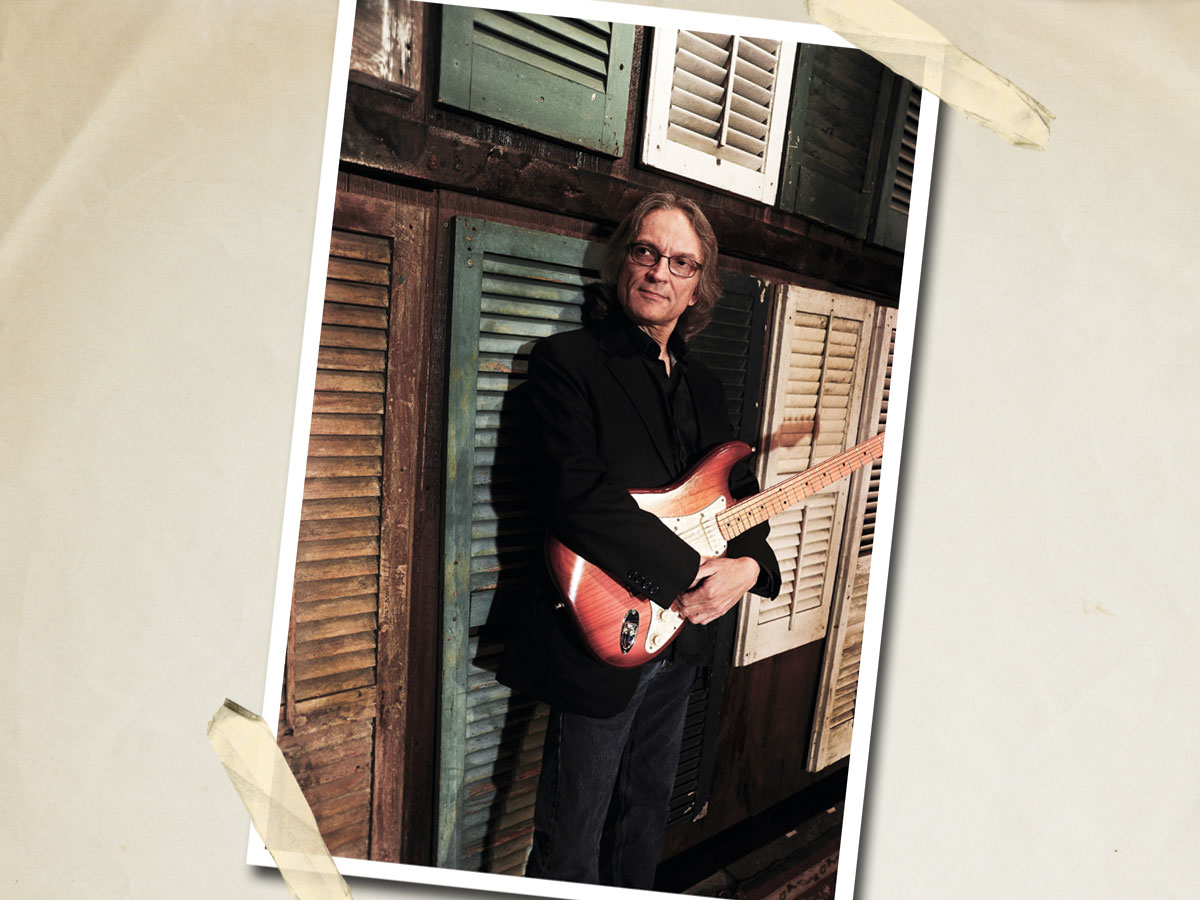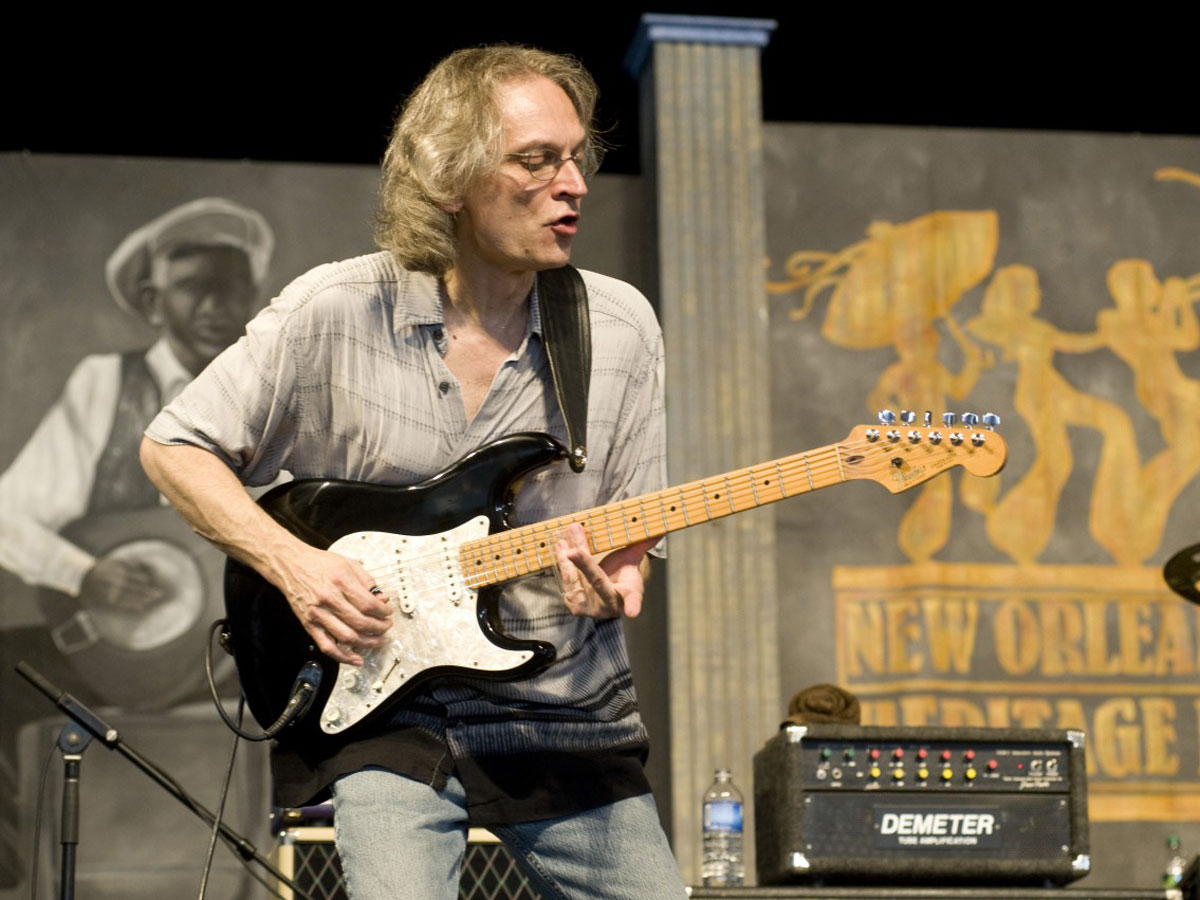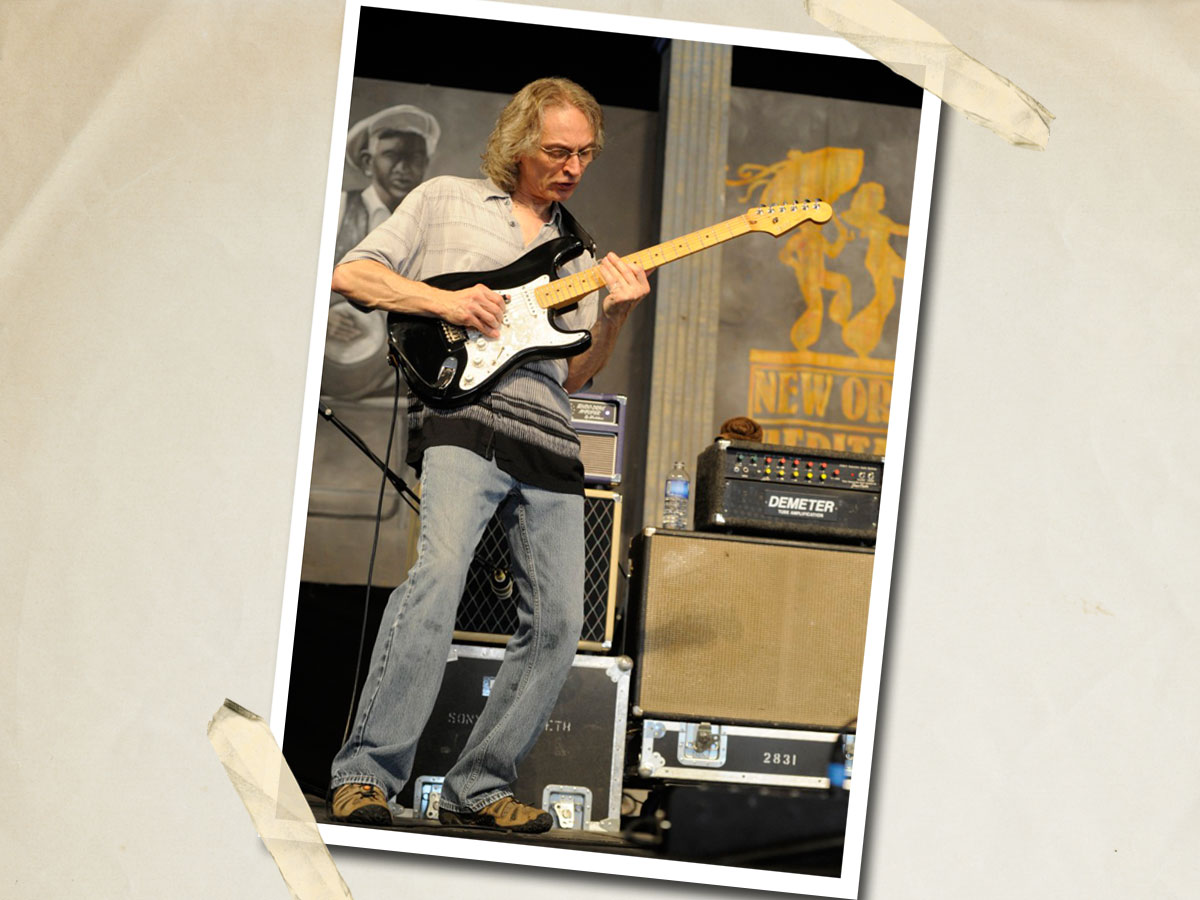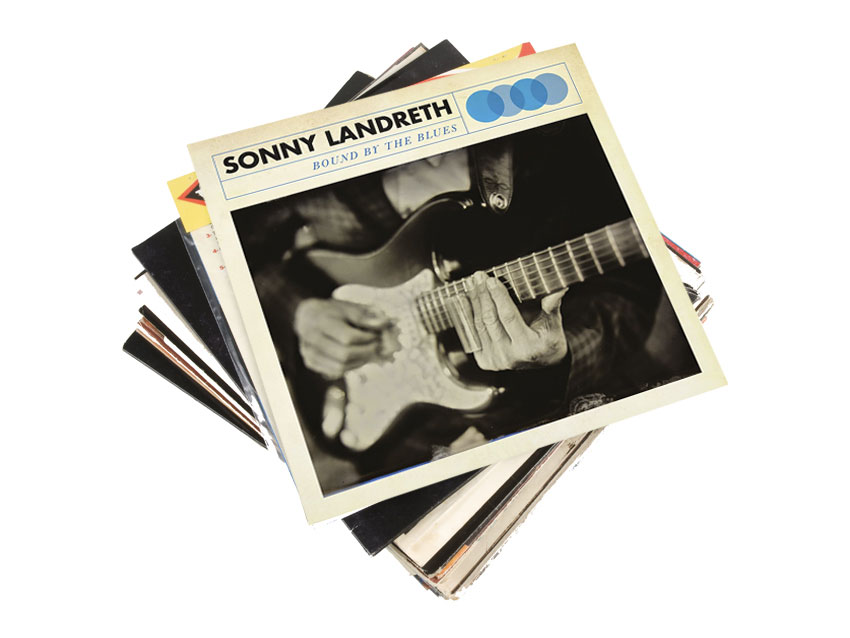Sonny Landreth on covers, Clapton and commando rigs
The Louisiana slide hero talks

Introduction
As he returns to his roots with new solo album, Bound By The Blues, the Louisiana slide man shares his wisdom on oddball techniques, the magic of mistakes and the joys of jamming with Clapton.
"In any discussion of the slide guitar’s greatest exponents, Landreth’s name must surely be near the top"
It’s just an ordinary glass cylinder. No more, no less. But when Sonny Landreth inserts his little finger and applies it to the neck of a Fender Strat, magic happens.
In any discussion of the slide guitar’s greatest exponents, Landreth’s name must surely be near the top, his inimitable ‘slydeco’ style powering everything from his sideman role with Clifton Chenier in the late 70s, to the solo career that began with 1981’s Blues Attack.
Even now, the sleeve of rootsy new album, Bound By The Blues - a close-up of the Louisiana bandleader’s near-mythical fingers - confirms that Landreth is happy for his fretwork to take the limelight.
“I don’t even think about celebrity,” drawls the 64 year old, in the first of many pearls of wisdom. “If you’re serious about music, that always comes first.”

Every maestro was once a novice
“My first attempt at slide was ugly, my friend. It was rough on my family. Sometimes, I’d throw the slide across the room. Because slide is hard.
"At first, I couldn’t get any sounds, because I had too light-gauge strings and the action was too low"
“It’s a different animal, in the fact that you’re not even using frets in a basic sense. Then you have this thing on your finger, and it just feels totally awkward.
“At first, I couldn’t get any sounds, because I had too light-gauge strings and the action was too low. I was obviously too stupid to know the difference, and it took a while to figure that out. It would have been real easy to quit right then and there. But like anything, you keep at it.
“It starts with falling in love with the sound of slide in the first place. If you really love it, you hang in there.”

Broaden your horizons
“It’s always good to listen to other kinds of music, and at least try your hand at them. Then, when you go back to your ‘thing’, it’s more enhanced. That’s also true if you tackle another instrument.
"I was really approaching it like a wind instrument player, in terms of phrasing"
“I actually played trumpet first, so when I got my first guitar three years later, I was really approaching it like a wind instrument player, in terms of phrasing, in particular.
“With a wind instrument - be that a trumpet, sax, clarinet, flute, whatever - you have to take a breath, and I think that gave me a different take on guitar and really helped me out a lot.
“Where some of my friends went 90 to nothing into rock ’n’ roll, I already had some sensibilities about dynamics.”

There's no such thing as a mistake
“Improvisation can go wrong. Oh, yeah. But you have to be willing to take the risk to achieve the reward.
"When you’re firing on all cylinders and it’s all clicking, it’s like nothing else"
“When you’re firing on all cylinders and it’s all clicking, it’s like nothing else. There’s such a sense of freedom. I would even go so far as to call it bliss.
“On the other hand, when it doesn’t work, it’s not. But then, sometimes, the mistakes will lead you into an area you wouldn’t haven’t gone otherwise. The great jazz trumpeter Clifford Brown was known for that.
“Back in the day, he’d make mistakes, and it would catapult him into a completely different area. All this cosmic playing would come from a mistake. People would love that about him, and it made it more real.”

It's all in the fingers
“Fingers are extraordinary things, how you can elicit and coax different sounds with them.
"It’s not always about changing an amp or changing a channel"
“It’s not always about changing an amp or changing a channel. It’s not always about stepping on another pedal. There’s a whole lot going on organically with the sound as it comes off the guitar.
“There’s a lot of things going on with my technique, but mostly it’s the fingerstyle approach, and with the right hand, there are other things going on [like slapping] in addition to the usual chores.
“Also, just moving the hand up and down the strings completely changes the timbre and tone. Then, with the left hand fretting behind the slide, it becomes a more dimensional sound. I guess it’s polyphonic - melody, harmony and rhythm, all at the same time.”

Don't be afraid of the deep end
“Oh man, playing with Clifton Chenier in 1979 was my real education in music. I always say it’s not unlike if I’d been in Chicago and Muddy Waters had taken me under his wing. That’s how important Clifton Chenier was.
"I swear, every night, he’d pull out a song that I had never done"
“Just an incredible musician, a visionary, with a powerful sense of the blues and how to fuel-inject that and many other things. I’ve never learnt so much about rhythm and syncopation. But he kept me on my toes.
“We’d play songs in a different key every night. Y’know, he’d call a blues tune and it might be in Eb - you just never knew. And I swear, every night, he’d pull out a song that I had never done. He was like a walking repertoire.
“And he was a big fan of Elmore James. That’s why he liked the slide so much. He loved having that as the counterpoint for the accordion.”

Meet your heroes
“When you play with Eric Clapton, you’d better bring something to the table. At the second Crossroads Festival, he said, ‘Oh, I want to come out and play with you.’
"Suddenly, here’s Eric Clapton, blowing a guitar solo, just like this possessed man"
“So we were playing Hell At Home and all of a sudden, here’s Eric Clapton, blowing a guitar solo, just like this possessed man. My God. That’s when it really hit me. Like, ‘Is this really happening? This is like a dream for me.’
“He was just so into it, and the whole band’s energy went up a couple of notches. And you go, ‘Oh, yeah. That’s why [he’s so famous].’ He’s unique. It really doesn’t get any bigger or better than that for me.”

Blues is an ocean
“With Bound By The Blues, I wanted to get back and do a blues album again. It had been a while.
"Like anything, the blues is only as limited as your imagination"
“Some guitarists think the blues format is limited? That’s what I call a prejudiced perception, and if that’s what you think then that’s all you’re gonna get out of it. Tell that to Ornette Coleman. Tell that to any of the great jazz musicians who would always go back to the blues for inspiration.
“Use that as the foundation and then take it to a different place where the sky’s the limit. That was sorta the idea with this album as well. I think, like anything, the blues is only as limited as your imagination.”

Three is the magic number
“I’ve had big bands with keyboards, accordions, horns - we’ve done all that. But I love the trio format. There’s a lot of things that I do texturally, and I think for my style, a trio gives me the space and freedom.
"Any time you add another instrument, it’s a give and a take"
“Any time you add another instrument, it’s a give and a take. The cool thing about a trio is you’re down to the bare bones and everything counts. A song might be more of a production in the studio, so then you have to think, ‘Well, how do I crystallise all those elements into a singular voice?’ That forces you to become more creative.
“You might look at it and be like, ‘Well, it’s only a three-piece band.’ But there’s this greater reality behind all that. There’s a lot of moving parts.”

Cover, don't copy
“I’m fascinated by how a really good song can be interpreted in different ways. With a cover, you want to pay homage to the song and recognise the significance of the history. But it’s important to find a fresh perspective.
"Some covers can inspire you to evolve and develop new techniques"
“There are some songs on the new album that I’ve been playing for a long time, and they’ve evolved so much. And then I realised that I had evolved, too, y’know? Key To The Highway is very different to the way I was first playing that song, many years ago.
“We actually recorded it on the Blues Attack album, back in ’81. It was in the key of E, I played a resonator and it was a totally different arrangement. Some covers you just play, but other songs become much more personal. They can inspire you to evolve and develop new techniques.”

The kids are alright
“Derek Trucks is my man. I heard him when he was a kid. I saw this clip on the news, this little kid playing slide. With everything being so accessible on the internet, it’s chops galore, so here’s another cute kid playing guitar. But it was a whole different thing with him, right from the get-go.
"Derek Truck’s challenge was greater, because he was close to the Allman Brothers"
“I remember, me and my bass player Dave Ranson, we looked at each other and said, ‘Yep, that kid’s got it. That’s an old soul there.’ He’s done nothing but expand all these years. He stretches the boundaries.
“If you think about it, Derek Truck’s challenge was greater, because he was close to the Allman Brothers. Everyone tried to emulate Duane, so that’s just where it started with him, but he’s taken it above and beyond. He’s amazing. On top of that, he’s just a sweetheart.”

Get your priorities straight
“In the past, I used to get home, then I’d go out with my friends, have a meal and go dancing. Music and food are a big deal down here in Louisiana.
"I literally have to fight for the time to practise the guitar"
“But these days, just to be home and sit on my couch, hang out with my dog and have a glass of wine is a pretty big deal.
“As you get older, there are so many things in life that you’ve got to deal with. Everything from your ageing parents to losing friends. I literally have to fight for the time to practise the guitar. But I have to make that happen - if I get past three days of not playing, it’s just not good for me.”

Every guitar has a song
“Guitars all have their own personalities, especially if you use a lot of different tunings.
"These days, it’s more about having a ‘commando’ combo rig"
“You might pick up a guitar and go, ‘Ah, I don’t like that.’ But then you start changing the tension and turning the tuners and that guitar might be perfect for ‘F’, so now that’s a whole different range that you maybe never played in before.
“That’s cool, but you can have too many guitars - and I think that I do. For me, these days, it’s more about having a ‘commando’ combo rig, where you can go anywhere, anytime, and you’re ready to go.”

Slide goes with everything
“A long time ago, a friend of mine came up the term ‘slydeco’ to describe my playing, and it stuck. It says a lot about the potential for slide guitar.
"That’s the beauty of slide. There’s a vocal quality about it that lifts up anything"
“I’ve always felt that slide has the ability to expand into a lot of different sounds and musical styles. That’s part of the beauty of slide. There’s a vocal quality about it that lifts up anything.
“There’s so much you can do to create sounds and textures and phonics, in addition to the big three - melody, harmony and rhythm. It creates a really complex sound.”

Art doesn't come easy
“I’ve learned that the best thing to do with writer’s block is just to let it go for a while.
"It’s important to hold yourself to high standards with an album, but maybe I get a little too carried away"
“You can hit a slump with anything, and sometimes you just need to get away from the guitar, stop thinking about it, do something completely different, and just have faith that it’s all part of the process. I mean, everybody goes through that.
“I think it’s important to hold yourself to high standards with an album, but maybe I get a little too carried away with it sometimes. But I’m really happy with Bound By The Blues. It’s good when it all aligns, y’know? It all comes out and you get that affirmation of pulling it off.”
Sonny Landreth’s latest album, Bound By The Blues, is out now on Mascot/Provogue.

